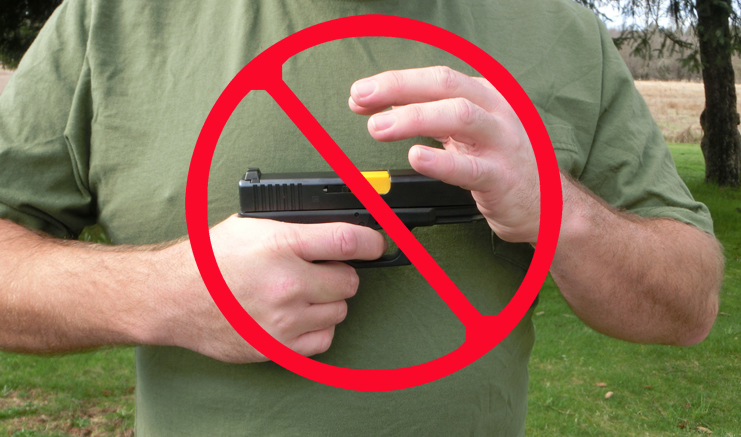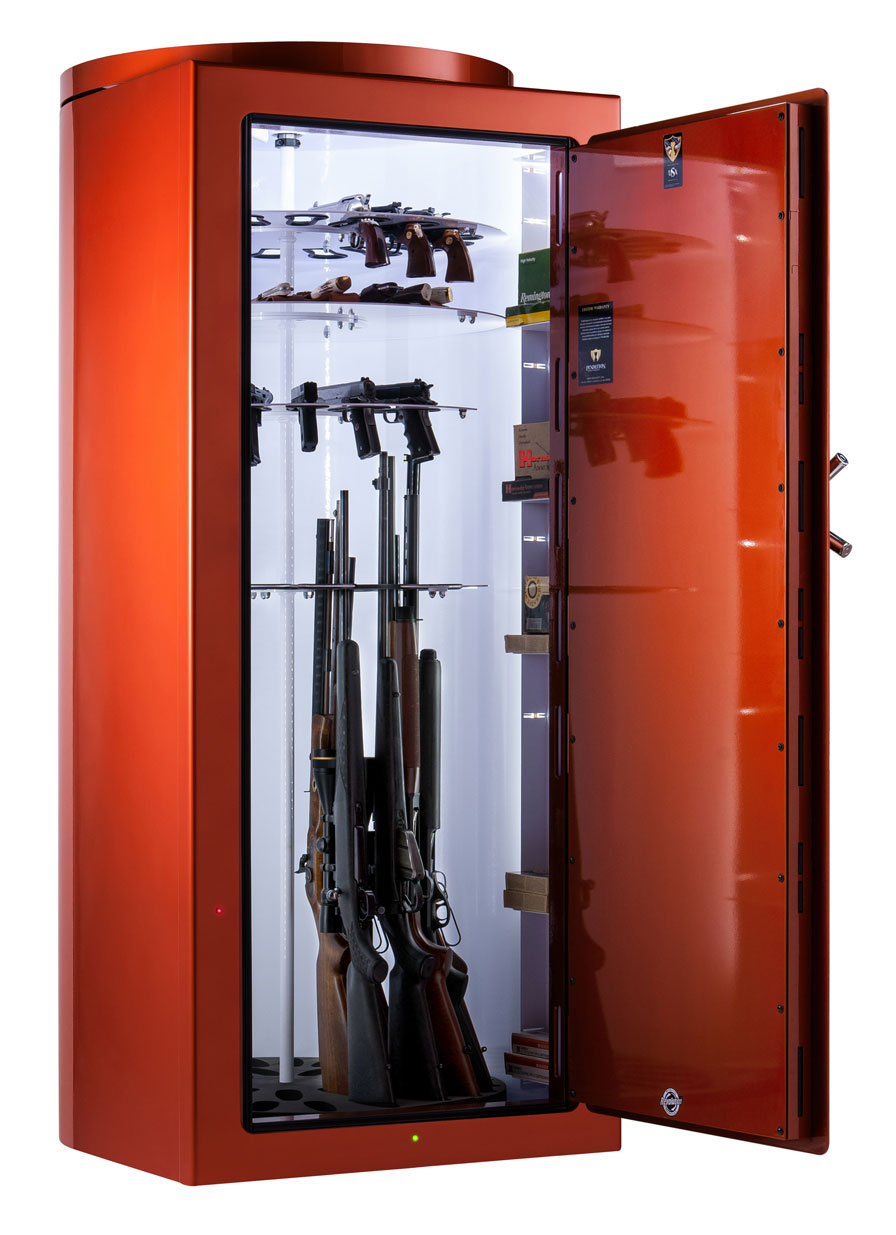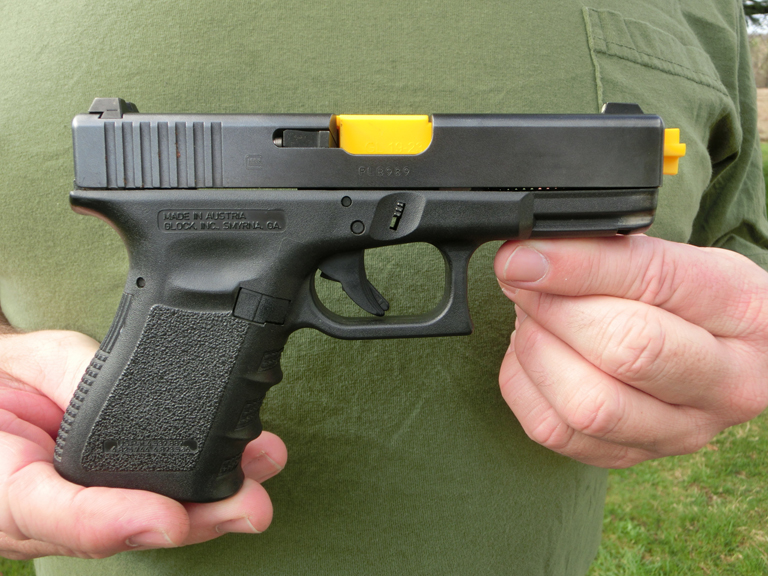Firearms are dangerous, but so is just about everything else in this world. There is always an associated risk when doing any sort of activity that we all accept. When you get in your car, you are driving a way in a death trap. When you play a sport, you are vulnerable to injury and in very rare cases, death. You cannot let these deadly things control who you are, and what you want to do. In every one of these cases, however, there are many ways to decrease the likelihood of death or injury, and with guns, it is no different.
If you are new to guns, or thinking about getting a gun for the first time, it is imperative that you learn how to safely handle these tools prior to using them. The most helpful thing for you to do is to find a hunter's safety or a gun safety class at your local gun range and take that immediately. It doesn't matter if you are actually hunting or not, 100% of the information provided in those classes can be used every single day you are handling firearms. Don't get discouraged if the class is full of 13 year old kids or if you are the oldest one there. The hands-on experience you get is going to much much better than reading some stuff online.
While you are here though, I can provide you with some safety tips. The information I will be giving though should reflect exactly what you find elsewhere. The gun community as a whole are one of the safest groups of people I have ever been around.
Always point the firearm in a generally safe direction.
Any time you handle a firearm, it is important that you treat it with the care and respect it deserves. Whenever a firearm is loaded, is has the ability, in the right hands, to almost instantly take a life. Just like if you are holding a rattle snake, you need to hold it so that you don't hurt yourself or others.
Point the muzzle of the gun, or the end where the bullet comes out, in a generally safe direction. Strait up in the air, down at the ground, down range, or just generally away from any people. Don't point it at people, or animals or in the direction of traffic. Failing to do this is called "sweeping" someone with your muzzle.
Sweeping other gun owners with your muzzle is a good way to get a gun pointed at you as well, and can ruin a good day at the range for anyone. If you see any one violating this rule, whoever they are, you need to IMMEDIATELY bring it up. There should be very swift and severe comments in that person's direction, if not physical intervention. Seriously, take the gun away from them if that is what is needed.
All gun rules are created equall, but if you break every other rule, following this rule will at least keep everyone alive.
Never point a gun at anything you don't intend to kill or destroy.
This is an offshoot of the first rule. The purpose of a firearm is to fire a projectile. Not doing that with the gun is like not having a gun in the first place. Basically, you are going to need to point the gun at something and fire it, but you need to ask yourself if you are willing to lose whatever it is you are pointing at.
 If you are hunting, pointing your gun at the deer, or hog, or duck you intend to kill is a necessity.
If you are hunting, pointing your gun at the deer, or hog, or duck you intend to kill is a necessity. Pointing your gun at the target downrange is required if you are going to shoot it. pointing the gun at the intruder you are defending yourself from is an important part to your survival in that situation.
Don't point your gun at your dog. don't point your gun at your brand new 55" flat screen on your wall. Don't point your gun at people who mean you no harm. this is a good way to lose your precious items, or even worse, a good way to kill someone important to you.
Keep your finger off the trigger until you are ready to fire.
Guns are designed to be held with your finger on the trigger so you can fire it comfortably. The ergonomics push your finger to it. It will feel awkward for you to keep your finger off the trigger, but do it anyway.
You know you are ready to fire when you have the gun up, pointed at your target, and when you are
aiming down the sights. Just as above, know your target and be sure it is something that you are okay with shooting.
aiming down the sights. Just as above, know your target and be sure it is something that you are okay with shooting.
At that point only, can you put your finger on the trigger, and pull.
Train your mind to never touch the trigger until you are ready. Don't even think about it. Some people don't even like putting their finger over the trigger guard. Keep your finger above the trigger, lying against the frame of the gun.
Many many negligent discharges happen because someone is is being careless and they have their finger on the trigger. Put just a little too much pressure on it, and the gun will do what it is told and fire.
I have never heard of a single instance of a gun, even a poorly made gun, "just going off." Guns don't "just go off." Guns are inanimate objects and they do not have a mind of their own. They cannot fire themselves. In cases where an inexperienced gunman claims "the gun just went off," that gunman has always had their finger resting on the trigger.
Always treat a gun as if it is loaded, even if it is not.
I don't care if you have checked that gun ten times to make sure it was unloaded. You could have a chamber flag in, and I still wouldn't care. At this point, it is not about whether it is safe or not, it is about creating a lifestyle and a habit of safety.
You might argue with me til you're blue in the face about how your gun is not loaded and how it is
safe, and the moment you forget that you left a round in the chamber, you are going to shoot your foot, or worse.
safe, and the moment you forget that you left a round in the chamber, you are going to shoot your foot, or worse.
Always pretend like there is a round in the chamber. check it ten times, please, but even after you check it, get into the habit of continuing to treat it as if there is a round in the chamber. Guns are dangerous, and many people find them scary. You might be comfortable in knowing your gun is unloaded, but
Know your target and what is behind it.
The bullets that guns fire vary wildly in size, weight and velocity when fired. each one reacts to a surface differently. Some rounds are designed to dispense all of its energy as quickly as possible, but some other rounds are just for fun, and do not have so much though put into them.
 A bullet can easily pass through a target and land some place far away. You could easily miss your target, which definitely send the bullet toward a location at a further distance than you intended. If you are shooting steel targets, and you happen to hit one, the bullet will shatter into a billion pieces and fly in just about every direction, sending lethal scraps of shrapnel hurtling in an unintended direction.Bullets will bounce off the ground, off trees, off steel, and especially off water.
A bullet can easily pass through a target and land some place far away. You could easily miss your target, which definitely send the bullet toward a location at a further distance than you intended. If you are shooting steel targets, and you happen to hit one, the bullet will shatter into a billion pieces and fly in just about every direction, sending lethal scraps of shrapnel hurtling in an unintended direction.Bullets will bounce off the ground, off trees, off steel, and especially off water.
Know whatever it is you are shooting at, and try to understand how the bullet will react when hitting it. Look past the target to make sure there is nothing behind it you might accidentally hit. Look around the target to make sure any shrapnel will not damage anything precious or hurt anyone you do not intend to hurt.
 I am married, but I have no children. I do not need to worry (right now) about children picking up my
guns, because there are no children around. I have a simple gun cabinet to keep my guns in, and I even keep a gun on my headboard. The unintended users in my situation are any intruders who might want to steal the most valuable things in my house... which are my guns...
I am married, but I have no children. I do not need to worry (right now) about children picking up my
guns, because there are no children around. I have a simple gun cabinet to keep my guns in, and I even keep a gun on my headboard. The unintended users in my situation are any intruders who might want to steal the most valuable things in my house... which are my guns...
 You can't just treat guns like you would the alcohol. "Just put it on the top shelf, they won't be able to get to it! they are like two feet tall!" well when your kids get into the booze, they just get a bit drunk. when kids get into the guns, they get a bit dead. The most heartbreaking stories on the news are ones where the ten year old kid finds dad's gun under his pillow and ends up shooting himself. Save yourself the heartbreak. Get something impenetrable.
You can't just treat guns like you would the alcohol. "Just put it on the top shelf, they won't be able to get to it! they are like two feet tall!" well when your kids get into the booze, they just get a bit drunk. when kids get into the guns, they get a bit dead. The most heartbreaking stories on the news are ones where the ten year old kid finds dad's gun under his pillow and ends up shooting himself. Save yourself the heartbreak. Get something impenetrable.
Store all firearms out of reach of unintended users.
Unintended users could be almost anyone, and the length that you go when storing your guns could change depending on your situation.
 I am married, but I have no children. I do not need to worry (right now) about children picking up my
I am married, but I have no children. I do not need to worry (right now) about children picking up my
If you live with children, you have to be much more careful. Do not store guns and ammo in the same place. Do not keep a gun loaded. Keep a gun in a locked container that only you can have access to. They make safes that use a fingerprint scanner, and if you think that is going overboard for just a few kids, then you don't know how crafty kids can be.
 You can't just treat guns like you would the alcohol. "Just put it on the top shelf, they won't be able to get to it! they are like two feet tall!" well when your kids get into the booze, they just get a bit drunk. when kids get into the guns, they get a bit dead. The most heartbreaking stories on the news are ones where the ten year old kid finds dad's gun under his pillow and ends up shooting himself. Save yourself the heartbreak. Get something impenetrable.
You can't just treat guns like you would the alcohol. "Just put it on the top shelf, they won't be able to get to it! they are like two feet tall!" well when your kids get into the booze, they just get a bit drunk. when kids get into the guns, they get a bit dead. The most heartbreaking stories on the news are ones where the ten year old kid finds dad's gun under his pillow and ends up shooting himself. Save yourself the heartbreak. Get something impenetrable.
If you have a code to get into your safe, never tell them the code. If you have a key, always keep that key on you. If you feel the need to have a gun near your bed, get one of those pistol safes that are specifically built for it, and then never let them see you use it. I will voice my opinion about kids and guns at a later date, but no matter what your opinion, it is common sense to keep guns out of the hands of anyone who is not responsible enough to use them.
Last word.
I hope that I have done this subject some justice. There is nothing more important when getting into firearms than safety. It is everyone's responsibility to make sure that they follow these rules and no one is exempt from them. If you are at the range and you see Jerry Miculek, and he is breaking any one of these rules, you are obligated to yell at this world record holder. Don't worry, he is very safe with his firearms, so you won't have to, but the point remains. I don't care who it is, or how long they have been using firearms. These rules stand for everyone.




I like the article, but what are your takes on dry fire practice and firearm safety? What kind of safe is the large orange one you have pictured?
ReplyDeleteI often do dry fire practicing when I am working on trigger control. I have a specific routine that I work through to make sure I stay as safe as possible. I have dummy rounds that are painted red, I never had live ammunition in the same room. I still make sure to dry fire in a generally safe direction, like a wall that faces outside.
DeleteThe orange safe is actually one of my favorites. I am not in the financial position to own one, but it is a Pendleton rotary safe.
http://www.pendletonsafes.com/products/